Rose Welsch Cervantes Helping Animals Cozumel
Rose Welsch Cervantes Helping Animals Cozumel
How I Became “The Poultry Whisperer” of Cozumel (More on Uri, Henrieta, Henley & The Rest of the Gang)
By Rose Welsch Cervantes
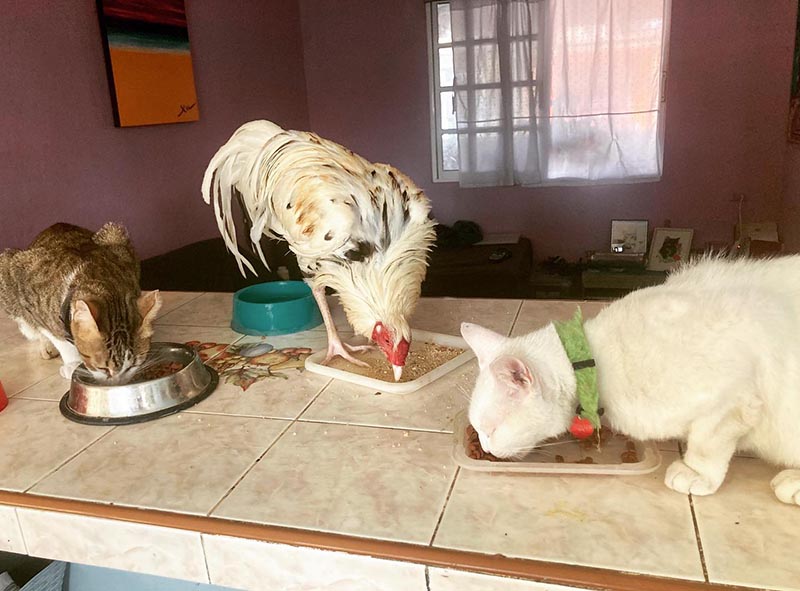
Some people call me an “Animal Whisperer” or “Poultry Whisperer,” in Cozumel, but the truth is, it’s the animals on the island who are the “Rose Whisperers”.
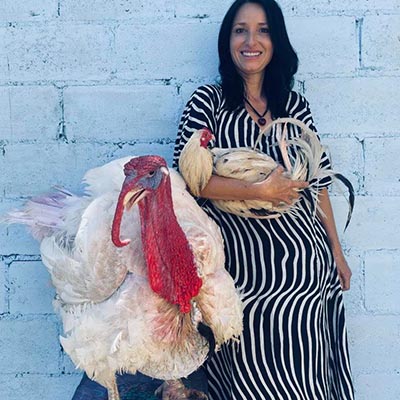
I moved to Cozumel in 2020 with the intention of EVENTUALLY adopting ONE senior dog. I had lived for three decades in big cities without ever having the time or opportunity to have a pet as an adult, so I wanted to ease into adoption slowly. Three days after I arrived, however, an abandoned black kitten came up to me as I was walking past an empty lot, looked me in the eyes, and meowed with such loneliness that I knew I had to take her home—even though I didn’t even have a home myself at the time.
Within a year, I had two cats (the second one I adopted from the Cozumel Humane Society), a huge turkey, a rooster, and was fostering and finding homes for a number of dogs and cats. My friend Tanya Whitlock also helped me transport the cats and dogs of my neighbors who don’t have vehicles to the Humane Society for sterilization.
I came across my turkey Uri in October of 2020, right before Hurricane Delta hit. I had rushed to a little grocery store in my neighborhood to buy some supplies before it closed, and heard a little chirping sound coming from a box underneath a table. I looked inside, and a single chick stared back at me. I couldn’t bear the thought of this little chick being alone in a cardboard box in the dark in a store during a hurricane, so I brought him home with me along with the coffee and milk I had gone there to buy. I had never had a turkey before, and didn’t even realize that he was a broad breasted “meat bird” turkey chick—meaning the type that has been unnaturally bred to get really big really fast. He was being sold in early October to be ready to eat by December.
Uri imprinted on me right away and we became inseparable. I used to take him to the beach a lot on my scooter so that he could take sand baths, but eventually he grew too big to fit on my scooter. He loved the beach though—most of all because he likes to show off and interact with people. This year Uri was featured on a channel called GeoBeats (similar to the Dodo channel), and more than a million people have viewed the story of his life here in Cozumel. It still makes me laugh that in my neighborhood, I’m known as “La Señora del Pavo.”
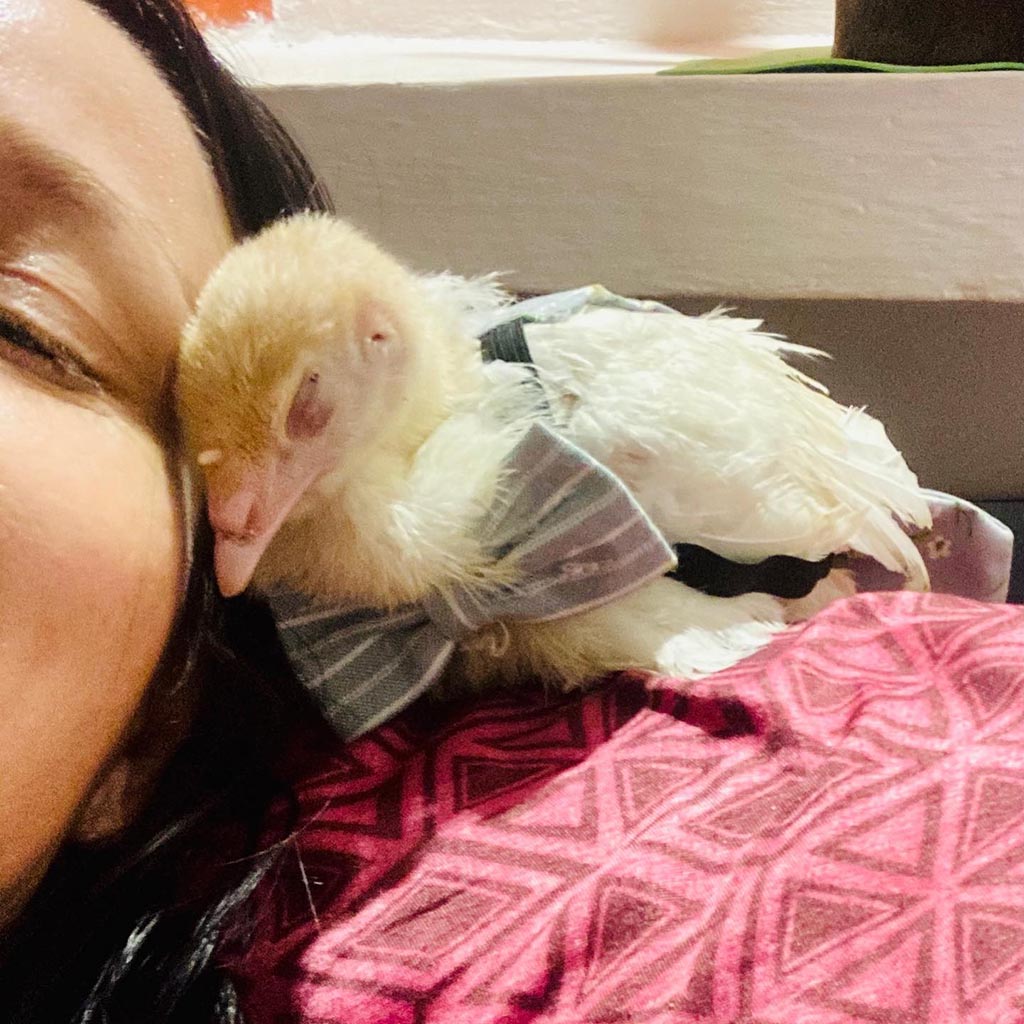
At the end of 2020, when my neighbor saw that I had a turkey, he said “I see that you like birds. I’m going to give you a fighting rooster one day.” And I said, “No thank you. My turkey is already the equivalent of three animals, plus I have cats and foster animals.”
But another reason I said no was because from the name alone, I assumed that fighting roosters were all mean, aggressive…just plain dangerous to be around. My neighbor has about 50 fighting roosters on the second floor of his house, and I had no interest in his pastime.
And then a few months later, just as I was leaving my house to get medical attention for my hand (someone had unexpectedly dropped off a very feral cat on my doorstep and asked me to get it sterilized for them, and the cat bit me), the neighbor appeared in front of me with a rooster in his arms and said: “Do you remember when I told you I was going to give you rooster? Well, here he is.” And he thrust a quiet rooster in my arms, with a rope still tied to its leg.
My heart melted a little bit when I held him, but at the time I had a total of 8 permanent and foster animals, plus a swollen, infected hand to deal with. I put the rooster out in my back patio, figuring I would deal with him after my doctor visit by returning him to my neighbor and telling him I didn’t have the capacity to take care of him. When I came back a few hours later, however, the rooster was standing forlornly in the same spot I had left him in, and my heart melted even more when I picked him up and held him.
I quickly discovered that far from being aggressive or mean, this rooster was a gentle soul who had fortunately survived three years of cruelty (like being blinded in one eye, having his comb and wattles cut off with scissors, being intentionally aggravated by having his feathers pulled and beak flicked, being used in cock fights, and being kept in a small cage indoors for years).
I named him Henley Xochipilli, and today he is an informal therapy rooster who helps people who have a fear of roosters, chickens, and birds overcome that fear. He is so gentle and sweet—even 2-year old kids can cuddle him.
I take Henley to the beach every week so that he can enjoy grass and sand, and also so that people—especially the next generation of kids—can see a fighting rooster as a beloved companion, not as an object to be used in a blood sport.
In July of this year a breeder of fighting roosters happened to be at a neighboring table while I was at the beach. He told me he had some game fowl hens (the female version of a fighting rooster) he didn’t want because they eat a lot and weren’t of any use to him. He offered to give them to me, so I adopted one to give Henley some companionship, and my friend adopted who lives out in the jungle adopted the other two.
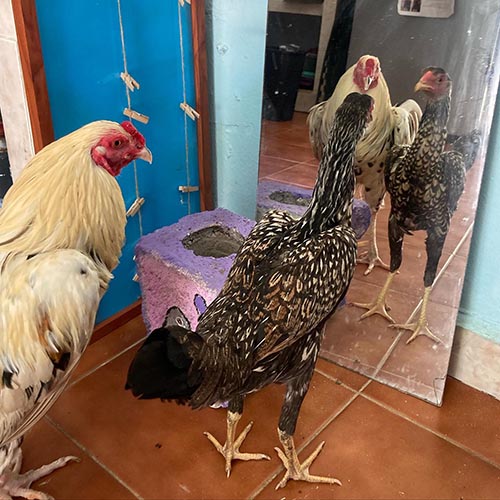
I named my new hen Henrietta Ixchel, and she was immediately smitten with Henley. She chased the shy boy around until he finally stopped running from her and now they are inseparable.
Henrietta is spunky and confident—maybe even a bit of a lovable narcissist. Her hobbies are snacking, staring at herself in the mirror, and snuggling with Henley.
So that is how I became “The Poultry Whisperer.” If I had a plot of land and money, I would build a sanctuary for unwanted game fowl hens and spent fighting roosters. For now, however, my house is a mini sanctuary for at least a few, and my life is all the better for it.
You can follow Uri the Turkey on Instagram at @mexican_turkey_uri, Henley at @henley_the_rooster and Henrietta at @henrietta_hen_protips.
Rose Welsch Cervantes is a private reading, math, and Spanish tutor with dual US and Mexican citizenship who can be reached at aicansee@gmail.com.
At the moment she does not have the capacity to foster or adopt more animals, but you can contact her for advice about fostering or adopting an animal in Cozumel, helping low income locals in Cozumel with transportation to get their cats and dogs spayed and neutered, and helping low income locals with tick medication.
She recommends supporting all of the animal welfare organizations on the island: Casa de Patas, HOPE Pro Defensa Animals Cozumel, The Cozumel Humane Society, Salvando Amigos y Dejando Huellas, and the Cozumel Animal Control Center. Support can be in the form of volunteering, fostering, adopting, donating supplies, or making a financial contribution.
Rose also welcomes donations of bird seed “semillas para gallos de pelea” for her ever hungry brood.
Cómo es que me convertí en la “Encantadora de Aves de Corral” (más acerca de Uri, Henrietta, Henley y el resto de la pandilla)
por Rose Welsch Cervantes
En Cozumel algunas personas me dicen “Encantadora de Animales” o “Encantadora de Aves de Corral”, pero en realidad los que son los “Encantadores de Rose” son los animales de la Isla.
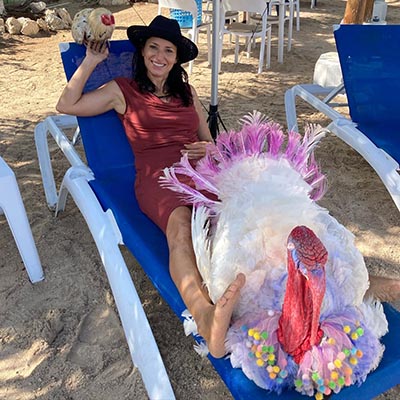
Me mudé a Cozumel en 2020 con la intención de que CON EL PASO DE TIEMPO adoptaría UN perro de mayor edad. Había vivido en grandes ciudades sin nunca tener tiempo la oportunidad, como adulta, de tener una mascota, por lo que quería irme adentrando al tema de la adopción lentamente. Tres días después de haber llegado, se me acercó una gatita negra que había sido abandonada en un lote baldío. Me miró a los ojos y maulló con tanta soledad que en ese momento supe que debía llevármela a casa; aunque en ese momento yo aún no tenía casa para mí.
Al cabo de un año, tenía dos gatos (el segundo lo adopté de la Sociedad Humanitaria de Cozumel), un pavo enorme, un gallo, era casa de adopción temporal y andaba en búsqueda de casas para varios perros y gatos. Mi amiga Tanya Whitlock también me ayudaba a llevar a esterilizar en la Sociedad Humanitaria a gatos y perros de vecinos que no tuvieran vehículos.
Me topé con Uri en octubre de 2020, justo antes del huracán Delta. Fui apresurada a una pequeña tienda de comestibles en mi colonia antes de que cerrara y escuché un suave graznido que procedía de una caja situada debajo de una mesa. Miré dentro de la caja y un polluelo solitario me miraba fijamente. No podía soportar la idea de que este polluelo permaneciera solo en una caja de cartón, en la obscuridad de una tienda durante el huracán, así que lo llevé a casa junto con el café y la leche que había ido a comprar. Nunca había tenido un pavo, y ni siquiera me había percatado que era un polluelo de pavo de doble pechuga, que es del tipo que se cría de manera no natural para que llegue a un gran tamaño rápidamente. Lo estaban vendiendo a principios de octubre para que estuviera listo para comer en diciembre.
Uri se encariño conmigo enseguida y nos hicimos inseparables. Solía llevarlo mucho a la playa a bordo de mi motoneta para que se diera baños de arena, pero con el tiempo creció demasiado y ya no cabía en la motoneta. Le encantaba la playa, sobre todo poque le encanta lucirse e interactuar con la gente. Este año Uri apareció en un canal llamado GeoBeats (similar al canal llamado Dodo), y más de un millón de personas han visto la historia de su vida en Cozumel. Todavía me hace gracia que en mi colonia me conocen como “La Señora del Pavo”.
A finales de 2020, cuando mi vecino vio que tenía un pavo me dijo: “veo que te gustan los pájaros. Un día te voy a regalar un gallo de pelea”. Y le dije: “No, gracias. Mi pavo equivale a tres animales, además tengo gatos y animales a los que doy adopción temporal”.
Pero otro motivo por el que dije que no fue porque, sólo por el nombre, supuse que todos los gallos de pelea eran malos, agresivos… simplemente estar cerca de ellos era peligroso. Mi vecino tiene alrededor de 50 gallos de pelea en el segundo piso de su casa y no me interesaba su pasatiempo.
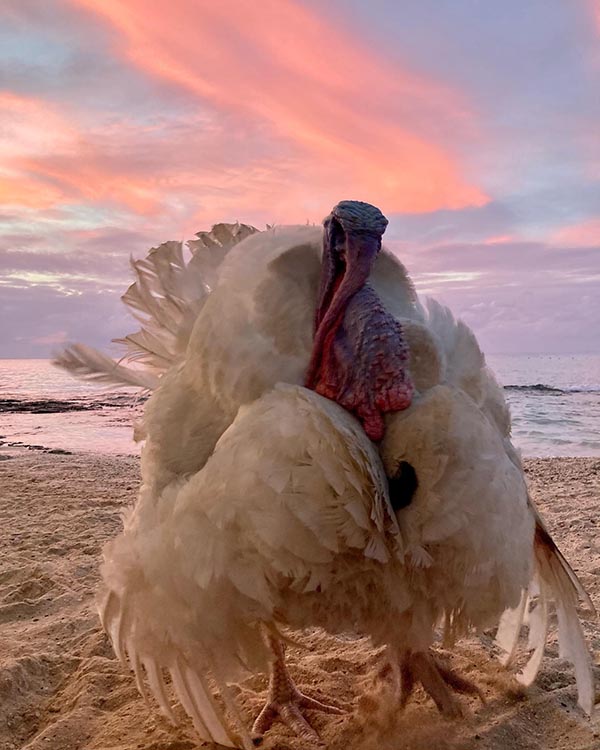
Unos meses más tarde, justo cuando salía de mi casa para recibir atención médica para mi mano (alguien había dejado inesperadamente un gato feral en mi puerta y me pidieron ayuda para llevarlo a esterilizar, y el gato me mordió), el vecino apareció frente a mí con un gallo en brazos y dijo: “¿Te acuerdas cuando te dije que te iba a regalar un gallo? Pues aquí lo tienes”. Y me puso en los brazos un gallo tranquilo, con una cuerda aún atada a la pata.
Mi corazón se derritió un poco cuando lo sostuve, y en ese momento tenía un total de 8 animales permanentes y de adopción temporal, además de una mano hinchada e infectada con la que lidiar. Puse al gallo en el patio trasero, pensando que me ocuparía de él después de mi visita al médico, devolviéndoselo a mi vecino y diciéndole que no tenía capacidad para cuidarlo. Sin embargo, cuando volví unas horas más tarde, el gallo se encontraba desolado en el mismo lugar en el que lo dejé, y mi corazón se derritió aún más cuando lo cogí y lo abracé.
Rápidamente descubrí que, lejos de ser agresivo o malvado, este gallo era un alma bondadosa que afortunadamente había sobrevivido a tres años de crueldad (como quedarse ciego de un ojo, que le cortaran la cresta y las barbas con unas tijeras, que lo acentuaran la gravedad tirándole de las plumas y dándole golpes en el pico, que lo utilizaran en peleas de gallos y que lo mantuvieran en una pequeña jaula en un ambiente cerrado durante años).
El nombre que le puse fue Henley Xochipilli y hoy es un gallo de terapia informal que ayuda a las personas que tienen miedo a los gallos, a las gallinas y a las aves a superar ese miedo. Es tan dulce y gentil que hasta los niños de 2 años pueden abrazarlo.
Llevo a Henley a la playa todas las semanas para que pueda disfrutar del pasto y la arena, y también para que la gente, en especial la próxima generación de niños, pueda ver a un gallo de pelea como un compañero querido, no como un objeto para ser utilizado en un deporte sangriento.
En julio de este año, un criador de gallos de pelea estaba en una mesa vecina mientras yo estaba en la playa. Me dijo que tenía unas gallinas de caza (la versión femenina de un gallo de pelea) que no quería porque comían mucho y no le servían para nada. Ofreció a dármelas, así que adopté una para que Henley tuviera compañía, y mi amiga que vive en la selva adoptó las otras dos.
Llamé a mi nueva gallina Henrietta Ixchel, y se enamoró inmediatamente de Henley. Persiguió al tímido muchacho hasta que éste dejó de huir de ella y ahora son inseparables.
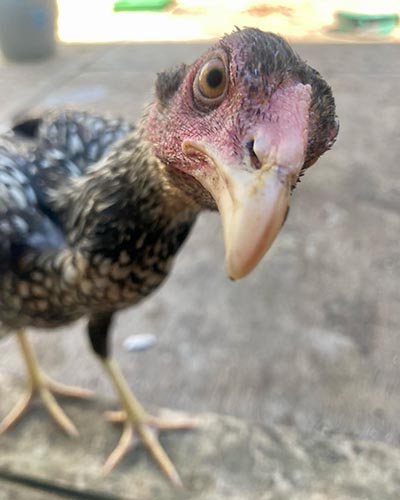
Henrietta es vivaz y segura de sí misma, quizá incluso un con tintes de adorable narcisista. Sus aficiones son picotear, mirarse al espejo y acurrucarse con Henley.
Así es como me convertí en “La Encantadora de Aves de Corral”. Si tuviera un terreno y dinero, construiría un santuario para las gallinas de caza no deseadas y en agotados gallos de pelea. Sin embargo, por el momento mi casa es un mini santuario para al menos unos cuantos, y mi vida es mucho mejor por ello.
Pueden seguir a Uri el Pavo en Instagram en @mexican_turkey_uri, a Henley en @henley_the_rooster y a Henrietta en @henrietta_hen_protips.
Rose Welsch Cervantes es una tutora de lectura, matemáticas y español particular, con doble nacionalidad estadounidense y mexicana a quien pueden contactar en aicansee@gmail.com.
Por el momento no tiene la capacidad de dar hogar temporal o adoptar más animales, pero puede contactarla con ella para que le asesore sobre cómo dar hogar de adopción temporal o cómo adoptar un animal en Cozumel, ayudar a los habitantes locales de escasos recursos en Cozumel con el transporte para esterilizar a sus gatos y perros, y ayudar a los habitantes locales de escasos recursos con medicamentos contra las garrapatas.
Ella recomienda apoyar a todas las organizaciones de bienestar animal en la Isla: Casa de Patas, HOPE Pro Defensa Animals Cozumel, Sociedad Humanitaria de Cozumel, Salvando Amigos y Dejando Huellas, y el Centro de Control Animal de Cozumel. El apoyo puede ser en forma de voluntariado, hogar de adopción temporal, adopción, donación de suministros, o aportaciones económicas.
Rose también agradece las donaciones de semillas para gallos de pelea para su prole siempre hambrienta.
______________________________
Una ex yanqui de Connecticut quien llama hogar a Cozumel desde hace más de 15 años. Laura escapó al Caribe hace años, desplazándose de una isla a otra dando clases de BUCEO. Se dedicó a perder el tiempo en Jamaica y finalmente se detuvo en Cozumel para pasar unas vacaciones de 2 semanas que aún no terminan. Convenciendo a sus padres que pagaran una elegante universidad privada, obtuvo su título en Periodismo y Laura crea semanalmente Cozumel 4You, medios sociales y artículos promocionales sobre la Isla y también es moderadora en el grupo Cozumel 4 You en Facebook que actualmente cuenta con 25,000 miembros. Fabián, s umuy tolerante marido, desde hace mucho tiempo se resignó a no tener vida privada, pues se ha visto implicado en los diversos proyectos y planes que urde Laura. Son orgullosos padres de diversos perros y gatos rescatados. Mientras contempla su paso a través de la vida en el Caribe mexicano,Laura continúa siendo la pesadilla en la existencia de su muy tradicional suegra mexicana.
- Cozumel Museum - April 25, 2025
- Feria Cedral Schedule - April 25, 2025
- Cozumel Home Security Systems - April 25, 2025
An ex-Connecticut Yankee who has called Cozumel home for over 18 years, Laura ran away to the Caribbean years ago, bumped around the islands teaching SCUBA diving, lost some time in Jamaica, and finally stopped in Cozumel for a 2 week vacation that hasn’t ended yet. With a degree in Journalism from a fancy private college she convinced her parents to pay for, Laura writes, edits, and creates the weekly Cozumel 4 You news, social media, and promotional articles about the island, as well as moderates the Cozumel 4 You Facebook group, which currently has over 25,000 members. Her long suffering husband, Fabian, has long since resigned himself to having zero private life, as he’s been involved in her various schemes and plots since his arrival. Proud parents to a variety of rescue dogs and cats, Laura continues to be the bane of her traditional Mexican mother-in-law’s existence, as she muses her way through life in the Mexican Caribbean. ______________________________ Una ex yanqui de Connecticut quien llama hogar a Cozumel desde hace más de 15 años. Laura escapó al Caribe hace años, desplazándose de una isla a otra dando clases de BUCEO. Se dedicó a perder el tiempo en Jamaica y finalmente se detuvo en Cozumel para pasar unas vacaciones de 2 semanas que aún no terminan. Convenciendo a sus padres que pagaran una elegante universidad privada, obtuvo su título en Periodismo y Laura crea semanalmente Cozumel 4You, medios sociales y artículos promocionales sobre la Isla y también es moderadora en el grupo Cozumel 4 You en Facebook que actualmente cuenta con 25,000 miembros. Fabián, s umuy tolerante marido, desde hace mucho tiempo se resignó a no tener vida privada, pues se ha visto implicado en los diversos proyectos y planes que urde Laura. Son orgullosos padres de diversos perros y gatos rescatados. Mientras contempla su paso a través de la vida en el Caribe mexicano, Laura continúa siendo la pesadilla en la existencia de su muy tradicional suegra mexicana.
Feria Cedral 2025
Feria Cedral 2025 La Feria de El Cedral & La Fiesta de...
Cabana Beach Cozumel
Cabana Beach Cozumel The Cabana Beach Now Offers New Options, New Packages...
Cozumel Current News
Cozumel Current News Cozumel Current News Text & Translation by Moises JH...
Three Cozumel topics that may be of interest
Three Cozumel topics that may be of interest Three Cozumel topics...


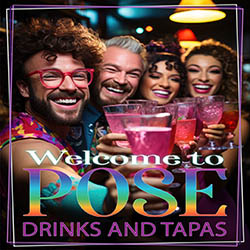
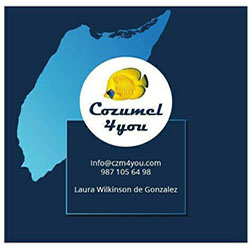




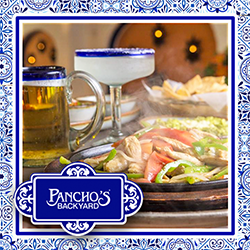
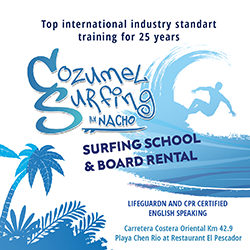
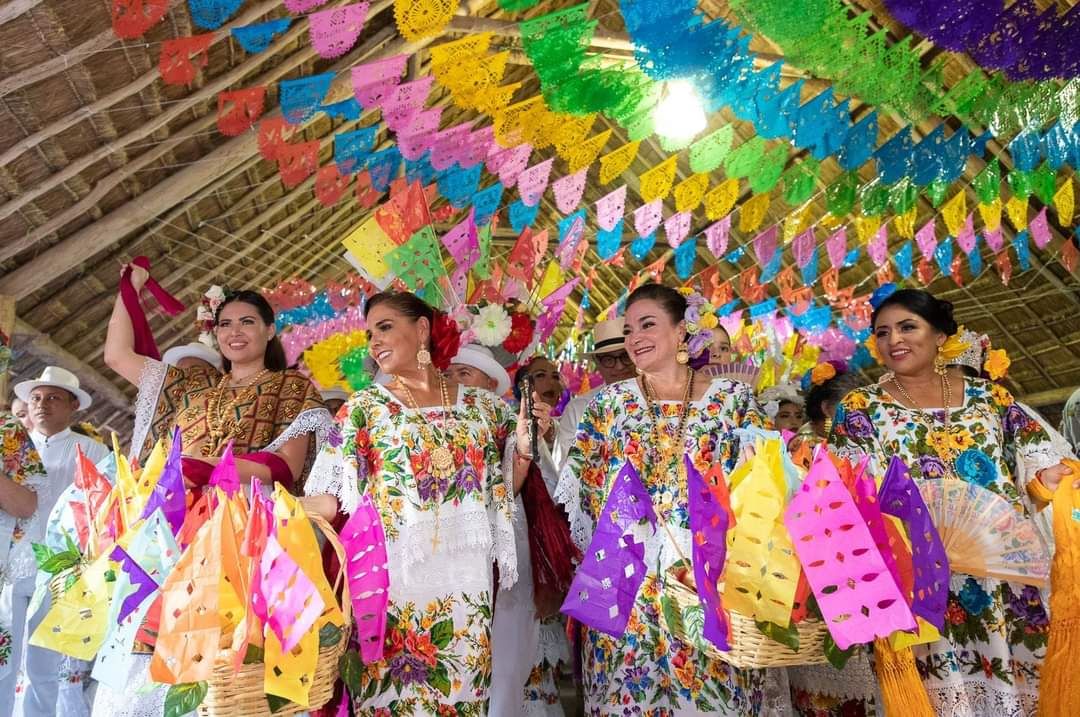
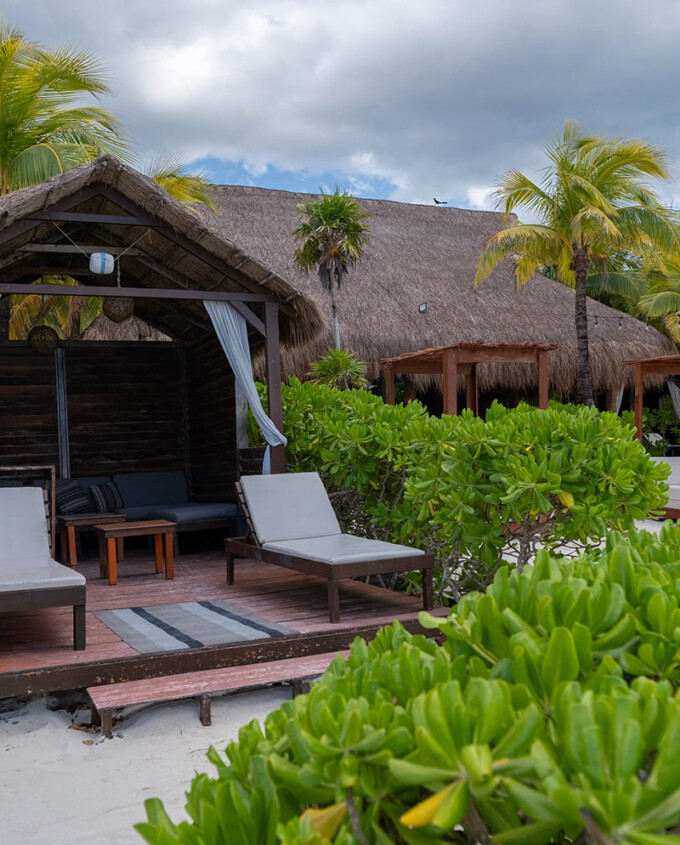
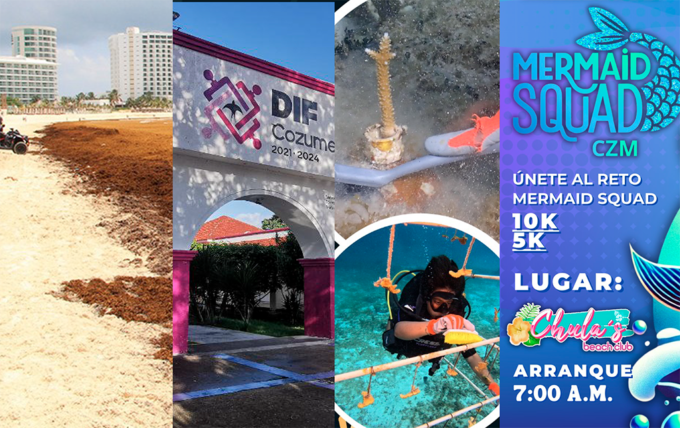


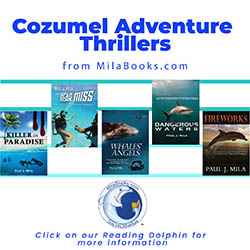



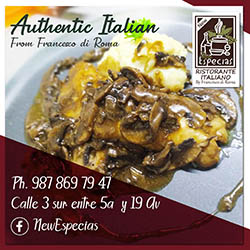



Leave a comment